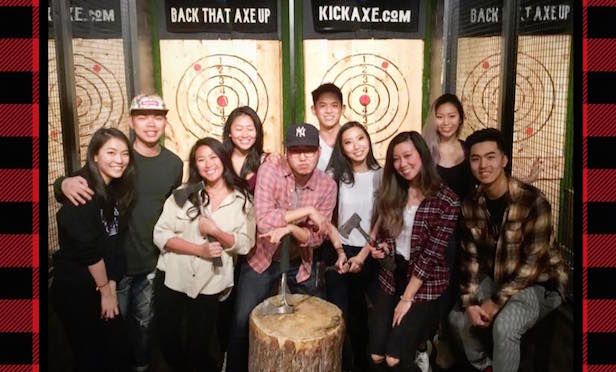 Kick Axe Throwing, Brooklyn, NY, an example of competitive socializing/ Image: Facebook
Kick Axe Throwing, Brooklyn, NY, an example of competitive socializing/ Image: Facebook
NEW YORK CITY—Businesses are getting more creative with experiential retail. “In an era where social engagement is waning, how do you get people to engage?” asks Patrick Smith, vice chair of brokerage at Jones Lang LaSalle.
A recent JLL retail research report states IBISWorld forecasts video game arcades and entertainment center revenue to grow only at a yearly rate of .8% through 2023. But the firm still predicts the competitive social landscape is poised for strong growth.
Smith was part of the team that won REBNY's 2018 Most Ingenious Retail Deal of the Year, representing Brookfield in their lease of 5 Manhattan West to Peleton. The winner of four REBNY Retail Deal of the Year Awards tells GlobeSt.com playing games is good business.
JLL has categorized a new retail sector of these games into six groups. The advisory firm calculated the percentages of each category within the pie of “growing national leisure concepts.” Smith says these mostly relatively new businesses provide reasons for people to come, engage in multiple activities and to return. The report sets forth the following:
Competitive socializing (32.1%) is the most popular leisure tenant. These venues offer activities like mini golf, ping pong or axe throwing—activities that on their own might not attract so many customers. “Shuffleboard, that's a sport that's highly considered something you would play when you're a senior citizen,” comments Smith. But these retailers “make it an interesting, fun, engaging place to be around.”
Beercades (26.2%) offer a wide selection of craft beers within an arcade of vintage games from the 80s or 90s. (Pac-Man anyone?) Barcade and Headquarters Beercade are examples of these outlets.
Eatertainment (22.6%) offers multiple games and experiences in one location. As one example, Dave & Buster's, established 30 years ago, now has more than 100 locations across the US in primary and secondary markets. The report states it's now looking to expand to 11 new locations in tertiary markets.
 Patrick Smith, vice chair of brokerage, JLL
Patrick Smith, vice chair of brokerage, JLLE-sports lounges and VR arcades (7.1% each) add technology to socializing. Smith points out how e-gaming evolved from Atari to something very sophisticated and interactive. For years, people could play electronic games with other gamers around the world. But now, with competitive levels of e-gaming, thousands of people can watch. People have gotten off the couch and out of their bedrooms joining social environments, where they can play on teams with groups of people.
VR [Virtual Reality] arcades are places with virtual reality headsets and computer-generated experiences. At the VOID, a company has bought the intellectual property rights from different movies. Donning the headset, “You have a fully immersive experience based on one of your favorite movies,” says Smith. “It's amazing. I've done it.”
Finally, escape rooms (4.8%) “trap” people in rooms or situations, where to “get out,” the team solves puzzles and riddles with clues.
These activities can require larger spaces. Smith has observed that part of the concept has been driven by opportunity. Where there's a large vacant retail space, people try to find figure out the best way to fill it. He states financially the venues collect multiple revenue streams, with the games, food and alcohol. With competitive activities, teams come in larger groups, including from corporations, schools and other organizations. Group-oriented activities guarantee certain revenue.
So, what's the likelihood of a neighborhood Beercade opening up near you?
“Most entertainment concepts are still very focused on where people are, where public transportation is,” says Smith. “They are going to take space to have a ground floor entrance and signage, then it's coming up or down to less expensive space.”
JLL believes these concepts will continue to rise in popularity. This is perhaps not despite but because people are on their phones looking at screens more and more. People will always want and need to engage and connect with other people in person, where brick-and-mortar retail can play a significant role.
“These kinds of concepts encourage social engagement,” Smith says.
Join the 17th Annual GlobeSt Net Lease Conference (formerly a RealShare event) on April 3 & 4 in New York City alongside the industry's most influential and knowledgeable real estate executives from the net lease sector. Click here to register and view the agenda.
© Touchpoint Markets, All Rights Reserved. Request academic re-use from www.copyright.com. All other uses, submit a request to [email protected]. For more inforrmation visit Asset & Logo Licensing.







